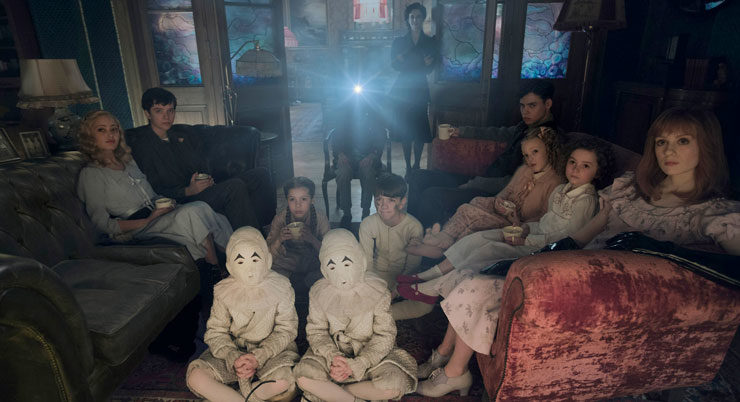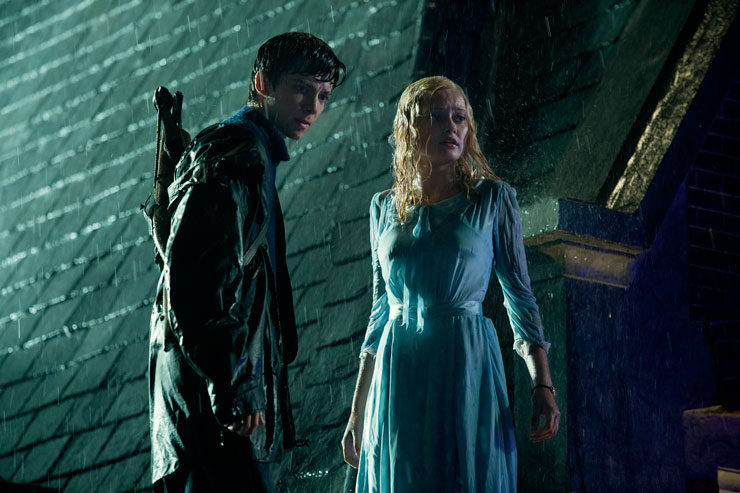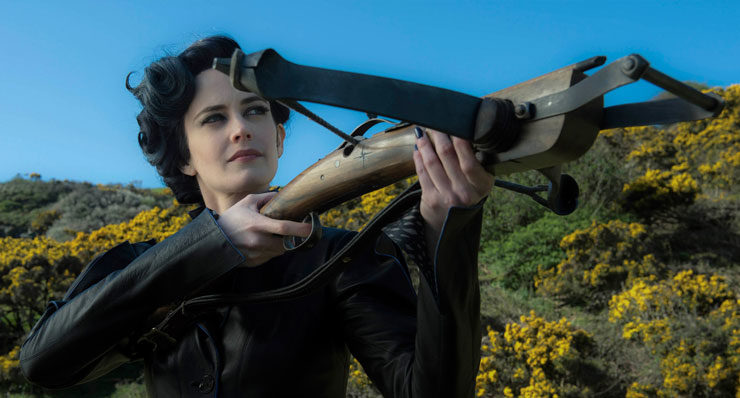Miss Peregrine’s Home For Peculiar Children landed at Austin’s Fantastic Fest with an almighty splash. The Alamo Drafthouse has been gearing up for the release of this film with Septemburton, a celebration of Tim Burton’s work that includes special menu items, a Tim Burton issue of BirthMoviesDeath, and a slew of Burton programming. At the festival itself, each screening has been preceded by choice picks from the Burtonize This! contest (many of which have been uproariously funny, it must be said), and the day of the film’s screening was declared Keep Austin Peculiar Day—and Burton himself put in an appearance on the festival red carpet.
It’s quite a lot of froofraw, and there was a certain amount of high expectation going in. After all, the fit between Burton’s filmic sensibilities and the Gothic eeriness of Ransom Riggs’s bestselling novel and its sequels is one of the most natural imaginable. And for the most part, the movie delivers on its potential, save for a a third act that is overwhelmed by the sheer weight of CGI flash.
Up until that point, though, the film is, for the most part, lovely and thoughtful. There are echoes of Burton’s Big Fish in the tensions among the men of protagonist Jake Portman’s family—Jake (Asa Butterfield) can’t really connect with his unimaginative, easily discouraged father, who himself has always been distant from his own father Abe (Terence Stamp). Abe enthralled his grandson with stories of a special home in Wales for children with strange abilities, presided over by a shapeshifting woman-falcon named Alma Peregrine—stories that Jake thought were true until he learned about the all-too-human monsters that plagued central Europe in the 1930s. One night, after a frantic phone call from Abe, Jake arrives at his grandfather’s house to discover the place has been ransacked, and something terrible has happened to Abe.
In the wake of the tragedy, Jake’s therapist (Alison Janney) advises a trip to the Welsh island that featured so prominently in Abe’s stories. Accompanied by his dubious father, Jake initially finds only disappointment—the children’s home spoken of by his grandfather turns out to have been destroyed in World War II, which apparently puts the lie to letters from Miss Peregrine that post-date the war. But soon Jake discovers—or is discovered by—some of the very children from Abe’s stories. They lead him into the loop in time—a beautiful September day, replayed over and over again—where Miss Peregrine (Eva Green) keeps her peculiar charges safe.

So far, so good. And for a while, the story unfolds in a series of carefully paced reveals. Jake learns what it means to be a “peculiar”—which, not to put too find a point on it, is something like being an olde-timey X-Man, with Miss Peregrine as their time-manipulating Professor Xavier: to name just a few, Emma (Ella Purnell) can control air, Olive (Lauren McCrostie) sets things on fire with a touch, and Enoch (Finlay MacMillan) can animate puppets and the dead. Jake learns the truth behind his grandfather’s stories and his extensive travels, and about the dangers posed by Hollows—horrible creatures that murder peculiars and devour their eyes—and by an evil peculiar called Barron (Samuel L. Jackson), whose dastardly plans endanger everyone.
It’s when Jake and Miss Peregrine’s charges ride off to rescue their protector and stop Barron’s diabolical schemes that the film descends into a kind of overstimulated dullness. (That it is also a significant departure from the source material is another discussion altogether.) The story becomes dominated by spectacular set pieces, like the raising of a wrecked ship and a battle against invisible Hollows on the pier at Blackpool; and there is the requisite showdown between the children and Barron and his cronies, in which everyone’s peculiarity plays a part in winning the battle. It’s all extravagantly rendered, loud, and flashy, and completely lacking the charm of the first two thirds of the film.
Which is disappointing, because up until that point Miss Peregrine feels like one of Burton’s better recent films. He avoids self-parody even when the story and aesthetic lure him in that direction, and he creates a mood of genuine melancholy around the peculiar children and the fact that their safe existence is at the cost of a normal life. They will never grow to adulthood or grow old, and they can never leave the time loop, or else grow old and die in an instant.

And the cast is a joy. Eva Green is sheer perfection as Miss Peregrine—surpassingly elegant, knife-sharp, witty, and deeply protective. The young actors playing the various peculiar children are all excellent, with Ella Purnell notable in particular for the delicacy with which she plays the awkward nature of Emma’s long-ago romantic feelings for Abe and the new attraction drawing her towards Jake. Asa Butterfield occasionally seems slightly overwhelmed by the proceedings, but carries on bravely, even when the set dressing threatens to overwhelm him. And then there’s Samuel L. Jackson, devouring scenery by the handful and apparently playing a near relation of the character he played in Kingsman: The Secret Service in terms of bombast and ambition (and, troublingly perhaps, in terms of being the only prominent cast member of color, whose significance as a character is entirely villainous)—but he seems to be enjoying himself so much that you can’t hold his over-the-top hamminess against him.
Miss Peregrine’s Home For Peculiar Children will doubtless be held by many as a solid return to form for Burton after the unevenness of Big Eyes, Dark Shadows, and Alice in Wonderland. And it very nearly is but for that third act. There is much to enjoy, but it’s hard to escape the conclusion that a large effects budget is perhaps not always a good thing for a film’s health.
Karin Kross lives and writes in Austin, TX. She may be found elsewhere on Tumblr and Twitter.










